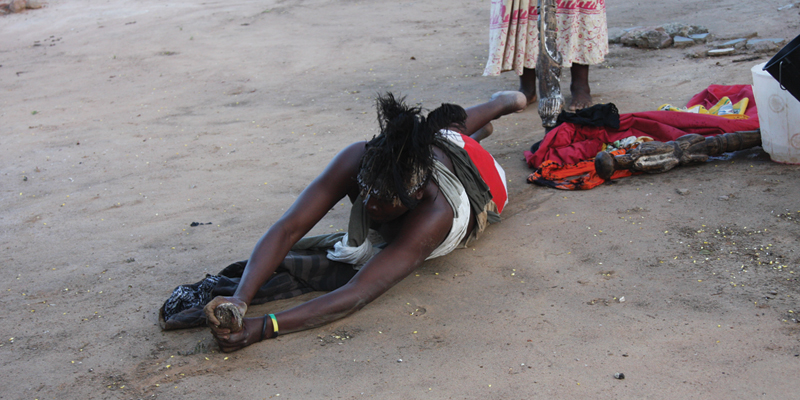
A group of children of school-going age gather at the back of a small granary, singing and dancing to contemporary jiti songs.
Silence Charumbira
At the centre of the circle are two energetic boys vigorously playing drums.
A few metres from the children sits a group of women close to a walking stick circled with knives stuck on the ground.
The walking stick is in front of a small hut whose entrance is covered with a white cloth, while several men sit under different trees at the homestead.
Such a setting has become common in Rusape’s Mayo area where traditional healers are holding cleansing ceremonies and allegedly exorcising people of evil spirits.
Commonly referred to as tsikamutanda, the crews move in groups and camp at different villages where villagers consult them about their problems for a fee — although most resort to paying using cattle and goats due to lack of cash.
Some villagers and teachers at nearby schools last week said people were being duped. They said it was suspicious that the traditional healers only come to offer their services during droughts.
- Chamisa under fire over US$120K donation
- Mavhunga puts DeMbare into Chibuku quarterfinals
- Pension funds bet on Cabora Bassa oilfields
- Councils defy govt fire tender directive
Keep Reading
The majority of youths make money through market gardening, but the drought Zimbabwe is experiencing has condemned them to poverty.
One of the teachers at Nyahondo Primary School said the practice was questionable as it remained unexplained why the healers never show up when people were expecting good harvests.
“They only come during droughts. Gaurani [another traditional healer] came when there was a drought, while another tsikamutanda came several years ago when there was drought,” said the teacher, who requested to remain anonymous.
Munetsi Ruzvidzo, the leader of one group of traditional healers, said the drought actually affected their income, but claimed money was not important to them. Ruzvidzo was at Village 13 in Mayo where he was taking a rest under a shade while his younger brother was operating from the “shrine”, where he was with several elderly men and women whom he called the village committee.
Villagers would take turns to get into the hut, which on a normal day would serve as village head Edmond Makara’s kitchen.
They would spend at least 20 minutes listening to the spirit-medium-possessed Ruzvidzo Junior speaking in an animated voice while narrating their stories.
According to Makara, who was the first to be assisted, the traditional healers gave them rest from their afflictions caused by super natural powers.
Although Makara was rather coy and would not divulge details of the problems at his homestead, sources in the village said a hairy animal with six teeth that looked like a cow’s and two horns that resembled a rhino’s was found at his house.
“I lost a 17-year-old son in the 90s and again in December last year I lost a daughter and they [traditional healers] have helped me a lot. I am relieved and can sleep without any worries now,” Makara said.
Some of the villagers appeared to be happy with the activities of the witch-hunters.
Young men and women in their 20s sat at the village head’s homestead the whole day singing, dancing and taking turns to enter the shrine to have their problems solved.
Tendai Biti (not related to the People’s Democratic Party leader), another villager who was in the shrine when the news crew arrived, said he was satisfied with what he had been told.
“I have no problems with what Sekuru said, but he said the issues in our family need the whole clan to be here,” he said.
Most women refused to speak to the media, while men showered praises on “Sekuru” and his team.
Luckson Chasi, one of the committee members, said Sekuru did not allow them to record the cleansing ceremonies.
“I do not know if any one of the villagers sneaked in with a cell-phone but everyone is told to leave their phones at home,” he said.
“People come in the morning and the committee leads them in paying respects to Sekuru through a process called kuombera.”
However, the cleansing ceremonies have become a threat to families as some are left humiliated and embarrassed, with the whole community accusing them of having goblins.
One of the villagers who was told that a relative of his possessed goblins was Brian Chirovamhangu (26).
“When I first got into the shrine, Sekuru told me to bring my father as the matters that were affecting me and the whole family required elderly people,” he said.
“He explained all that had happened in my life accurately and when I brought my family and my grandmother, we discovered that she [grandmother] had a goblin in her pillow which was responsible for all the problems we were facing as a family.”
The family gave Ruzvidzo a cow as payment.
Although Ruzvidzo said he had only managed to get one beast and nine goats for the three days that he had been operating in the village, sources said he in actual fact had three cattle.
A carpenter by profession, Ruzvidzo is registered with the Traditional Medical Practitioner’s Council.
Originally from Magunje where he says his prowess rages like a veld fire, Ruzvidzo is a polygamist and works with his second wife. The first wife is a teacher. He said they charged between $20 and $300, depending on the extent of the problem.
Ruzvidzo claimed he was more concerned with assisting people, giving the example of Makara, who he said only paid him a few chickens for his services.
Ruzvidzo said he normally sold the beasts used as payment to fellow villagers as his home was a long way from Rusape.










